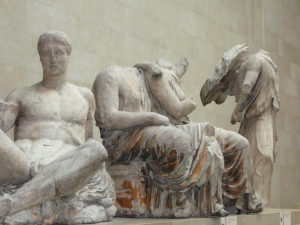I’ve written about the Elgin Marbles multiple times, most recently last August. For those unfamiliar, the Elgin Marbles are a series of sculptures and friezes kept in London’s British Museum that was originally part of the Parthenon in Athens. Lord Elgin, the British ambassador to the Ottoman Empire occupying Greece, removed the sculptures from the site between 1801 and 1812. Though the British Museum is considered one of the largest and most popular museums in the world, its administration seems to interpret the institution’s prestige as a carte blanche to act like an entitled older sibling. On top of their refusal to repatriate the Elgin Marbles to Greece, they have also refused to consider repatriating their large collection of Benin Bronzes pillaged from Nigeria in 1897. They have also continued to keep British Petroleum as a major donor despite the entire British museum community abandoning oil and gas companies. Furthermore, their attempts to hop onto the crypto bandwagon have resulted in hundreds of tons of carbon dioxide being spewed into the atmosphere so they can mint NFTs of their collection highlights. But maybe the museum administration is finally starting to see reason. UNESCO announced last week that the British and Greek governments would enter into formal talks regarding the fate of the Elgin Marbles.
Last week, UNESCO’s Intergovernmental Committee for Promoting the Return of Cultural Property (ICPRCP) held a session in Paris, where they announced that talks would be arranged. Previously, the British government has consistently stuck with the explanation; that the British Museum legally owns the Parthenon Marbles. Though the British Museum is a public institution, it operates independently from government oversight. Therefore, it is not up to the government but rather the museum’s board of trustees to decide on repatriation. Greece has tried to play nice with the Brits, offering compromises like an exchange program similar to the one they have with Italy. However, until now, the Brits have consistently parroted the same excuses and rejections. But the British public has been turning to favor the return of the Parthenon marbles, including a former British culture minister. Even Prime Minister Boris Johnson, while a classics student at Oxford, wrote a sharply-worded defense of the marbles’ return to Athens. He referred to Britain as a “northern whisky-drinking guilt-culture” unfit to serve as the marbles’ caretaker. Rather, they belong in “a country of bright sunshine and the landscape of Achilles, ‘the shadowy mountains and the echoing sea’.” But I suppose it’s not surprising that, since becoming Prime Minister, Johnson has tamed his Hellenophilia and maintains the legality of the marbles’ ownership by the British Museum. But the British Museum board of trustees may now have to face the music, as stubborn as they tend to be.
The Elgin Marbles have served as a sort of holy grail for art repatriation efforts worldwide. Elgin apologists will often use the slippery slope argument, saying that the return of the Parthenon Marbles will open the floodgates and lead to the British Museum being forced to repatriate its great treasures. This means collection highlights like the Rosetta Stone, the Younger Memnon bust, the Benin Bronzes, and the Double-Headed Serpent would all return to Egypt or Nigeria or Mexico. While that’s unlikely to happen, would it be so bad even if it did? Does Britain have so little culture of its own that it finds itself desperate to fill the galleries of its greatest museum with the works of other peoples? I hope that agreeing to formal talks proves that the British government is perhaps becoming a little more mature in handling similar matters.

